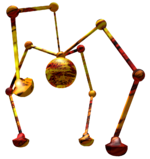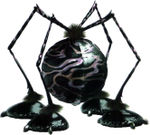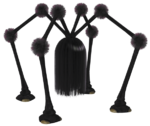Arachnorb family
The arachnorb family (ダマグモ科?, lit.: "Orb spider family") is a species of enemies in the Pikmin games which resemble giant spiders. Every member is a boss, and the family has a tendency to merge with inorganic components. The first member of the family that was introduced is the Beady Long Legs, as an official boss in the first game; it is found just once in the game, excluding Challenge Mode, and has its own boss theme. The Man-at-Legs and Raging Long Legs made their debut in Pikmin 2, the Shaggy Long Legs and Baldy Long Legs were discovered in Pikmin 3 and the Groovy Long Legs made it’s debut in Pikmin 4.
All known creatures in this family are in the Pseudoarachnia genus.
Members
Baldy Long Legs
- Main article: Baldy Long Legs.
The Baldy Long Legs is a Mission Mode and Bingo Battle mode exclusive enemy in Pikmin 3. Like its hairy counterpart, it is also considered a mini-boss, however due to never appearing in Story Mode, it does not play the remixed Pikmin 2 boss theme. It is the only Arachnorb that never stops to rest, save to shake off Pikmin. Although simpler to defeat than the Shaggy Long Legs, its lack of resting and constant roaming make it a little harder. It reappears in Pikmin 4.
Beady Long Legs
- Main article: Beady Long Legs.
The Beady Long Legs first appears as a boss in Pikmin, and reappears in Pikmin 2 as a more common boss, in the main game and Challenge Mode. The only attack it has is stomping around, but its large feet make this more dangerous than it sounds. Its body is its primary weak point; therefore, defeating it is easiest with Yellow Pikmin, because they can be thrown higher. This point is a bit more moot in Pikmin 2 given the lower altitude at which the orb reaches. The alternative strategy is to throw Purple Pikmin at its legs. When defeated, it instantly disintegrates into dust, releasing the contents from its orbicular torso.
Groovy Long Legs
- Main article: Groovy Long Legs.
The Groovy Long Legs appears as a boss in Pikmin 4. Its abdomen is covered in bright lights reminiscent of a disco ball, and it stomps to the beat of its own boss theme, which it can speed up and slow down at will; when angered, it stomps with enough force to knock the player and their Pikmin into the air and can do so with two legs at once. While its abdomen is large enough for any Pikmin to reach, it can release gas from its underside that confuses Pikmin and forces them to "dance" directly underneath its body, leaving them helpless if the player doesn't anticipate when it uses the gas.
Man-at-Legs
- Main article: Man-at-Legs.
The Man-at-Legs appears as a boss in Pikmin 2 and Pikmin 4. Unlike the other known Arachnorbs, it is a biomechanical creature and has very spindly feet that can't squash Pikmin, making its battle strategy different. It moves around quickly, and stops only to use its blaster-like weapon to attack when it has been agitated with attacks. It has its flaws, though; there is a visible laser it uses to target the Pikmin, making it obvious where it's going to shoot. These enemies are usually found in arenas that have barriers and obstacles that can be used as shields against the blasts.
Raging Long Legs
- Main article: Raging Long Legs.
The Raging Long Legs is a boss in Pikmin 2. It bears a resemblance to the Beady Long Legs in overall body structure, but has bigger, hairier feet, a larger body, is shiny and black with purple bands, and moves more slowly. Like the Beady Long Legs, if it is harmed enough that it becomes agitated, it shakes any attacking Pikmin off and starts stomping madly. This is extremely dangerous since its feet are very large, and Pikmin take a little time to get up after they are shaken off. Its body is so large, however, that any kind of Pikmin can be thrown without waiting, and dodging it should be a rather trivial thing, so it isn't hard to defeat as long as Pikmin are called back before it rages.
Shaggy Long Legs
- Main article: Shaggy Long Legs.
The Shaggy Long Legs is a mini-boss in Pikmin 3 with a general body structure similar to that of the Beady Long Legs, only black, like the Raging Long Legs. It is unique in that it has hair covering its joints, feet, and body. The hair and overall body color varies depending on the area it is found, and can also spawn without any hair on both the feet and spherical body. In order to defeat this beast, Pikmin must climb up its legs, and when they reach a hairy joint, they will stop to attack it. Once the hairs are cleared, the Pikmin can move on to the leg's other joint and remove the hairs there. When a joint is cleared, however, the creature will shake its leg, throwing the Pikmin down. After the main torso's hair falls off, it finally becomes vulnerable to heavy damage. A golden variant also appears in The Ship Restored.
Naming
The family name itself is a combination of "arachnid" and "orb", as all the arachnorbs look like spiders, and their bodies are shaped like orbs. This name might also be a pun on orb-weaver spiders.
The names of the creatures in this family are a pun on "daddy long legs", the name given to real world arachnids on the pholcidae family and opiliones order. Daddy long legs have long, spindly legs and a small body, much like the arachnorbs. The name of the Man-at-Legs is a pun between that and man-at-arms. These creatures's Japanese names follow a scheme along the words "Orb Spider" (ダマグモ?), referring to their spidery appearance and bulbous centers. The word Pseudoarachnia used in the scientific name of these creatures represents the genus, and means "pseudo-arachnid", with pseudo being Greek for "fake", and an English word in its own right, and arachnia being a reference to arachnida, the real world class for spiders.
Names in other languages
| Language | Name | Meaning |
|---|---|---|
| ダマグモ科? Dama Gumo Ka |
Orb spider family | |
(traditional) |
球蛛科 | |
| arachnorbes | From "arachnide" (arachnid) and "orbe" (orb) | |
| Arachnorben | ||
| Tarocnidi | From aracnidi (arachnids) and possibly the colloquial term tarocco (meaning "fake"). | |
| 박거미 과 | ||
| Aracnorbios | From "arácnido" (arachnid) and "orbe" (orb) |


